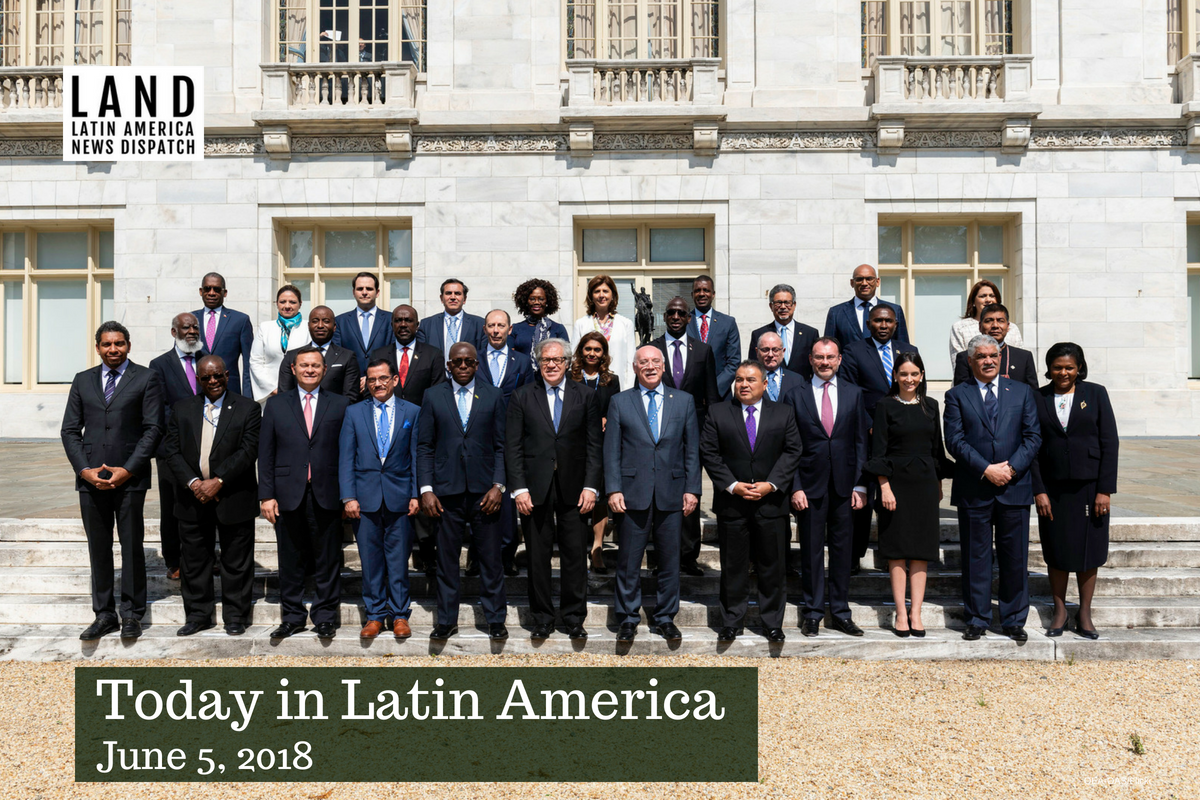

Official Photo of the 48th General Assembly of the OAS. (Photo via OEA-OAS on Flickr)
VENEZUELA-UNITED STATES: The Trump administration used the General Assembly of the Organization of American States yesterday to call for the suspension of Venezuela and the use of other forms of pressure to restore its constitutional order. Out of the 34 member states, 20 had already agreed to include an item related to the crisis in Venezuela in the agenda for the first time ever. Vice President Mike Pence announced last night at a reception at the White House that the suspension process would begin today. The U.S. ambassador to the OAS, Carlos Trujillo, said that his country had at least the 18 votes required for initiating the process although not yet the 24 necessary to fully implement a suspension.
Venezuelan President Nicolás Maduro responded from Caracas by accusing the U.S. of pressuring countries to side with it by threatening to withdraw financial aid and even impose sanctions. Venezuela’s foreign minister Jorge Arreaza joked that Venezuela can’t be ejected from a place it has already left, as the socialist country already began the two-year process to leave the organization in April 2017.
HEADLINES FROM THE WESTERN HEMISPHERE
NORTH AMERICA
MEXICO: A federal court announced yesterday that it had ordered a new investigation into the disappearance of the 43 Ayotzinapa college students in 2014 under the supervision of a specially created Investigation Commission for Truth and Justice. The court in the Mexican northern state of Tamaulipas said the first investigation by the General Attorney’s Office was not “prompt, effective, independent or impartial” and that there are enough indications that confessions that formed the basis of its conclusions had been procured through torture. The commission will be made up of representatives of the victims, the National Human Rights Commission and federal prosecutors.
UNITED STATES: The United Nations Human Rights Office demanded the U.S. government “immediately halt” its policy of separating children from families apprehended crossing its southern border with Mexico without legal documentation. Rights office spokeswoman Ravina Shamdasani called the policy a “serious violation” of the rights of children this morning from the organization’s Geneva offices in Switzerland.
THE CARIBBEAN
CUBA: President Miguel Díaz-Canel met on Monday with Google executive Eric Schmidt to discuss connecting the island to undersea fiber-optic cables that would allow faster access to the internet than the current cable that connects Cuba to Venezuela. Republican Sen. Jeff Flake of Arizona was also present at the meeting in Havana, which constituted Díaz-Canel’s first official meeting with U.S. representatives.
CENTRAL AMERICA
GUATEMALA: The death toll from the Volcán de Fuego explosion has risen to 69 and is expected to go higher. Only 17 of the recovered bodies have been identified and DNA samples may be needed to identify the rest. Authorities have said the volcano entered the eruptive phase Sunday at 6am but activity then diminished which is why an evacuation alert wasn’t issued. At 2pm there was an explosion and fast-moving flows of lava and hot ash mud flowed down the volcano and reached villages on the mountainside before people there could be alerted.
NICARAGUA: At least five people died in Masaya, a small city in the metropolitan area of the capital Managua, during clashes between protesters and security forces on the night of Sunday to Monday. Residents have set up improvised barricades around the city to keep out the police and paramilitary groups loyal to the government and rights organizations have denounced summary executions of protesters by the police. Yesterday, the government of Daniel Ortega called for the opposition to return to the negotiation table.
THE ANDES
COLOMBIA: Three community leaders were killed in Colombia in less than 24 hours during the weekend, for a total of seven murders in the last week and more than 200 since January 2017. A former FARC guerrilla was also murdered on Saturday, raising the toll of deaths since the demobilization of the rebel army to 60 according to its own figures.
SOUTHERN CONE
BRAZIL: A wave of criminal attacks in the Brazilian state of Minas Gerais has resulted in 25 burned public buses. The attacks began on Sunday afternoon and happened in 17 different cities of the southeastern state including the capital, Belo Horizonte. The motive, or even if the attacks were part of a coordinated effort, is still unclear.
GOT NEWS? Send the editors tips, articles and other items for inclusion in Today in Latin America to tips@latindispatch.com.
Want to receive Today in Latin America direct to your inbox? Sign up here.


